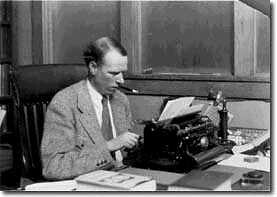
Sinclair Lewis (1885-1951), author
Copyright 1997 State Historical Society of Wisconsin
The historical setting in which Sinclair Lewis' It Can’t Happen Here takes place is very different from the one in which we live today. Our economy is not in collapse, leaving millions unemployed and starving. (At least not yet -- there are some disturbing omens, such as a growing gulf between rich and poor, out of sight oil prices coupled with an insane balance of payments deficit, and a steeply declining dollar, but the world may conspire to pull the US through.) In Lewis' time European fascism was on the march and the US ruling class, with less reasoned evidence, saw Soviet Communism as also an aggressive challenger.
We do live with far too many parallels -- we too suffer from noxious media that inflame populist passions against the rule of law, from racism and xenophobia (now aimed particularly at those other Semites, those perceived to be A-rabs), and from unscrupulous corporate profiteers and politicians who think that they can hold on to power by manipulating the baser passions of some of the people -- and who may learn that their "dupes" own them.
But history does not repeat itself and novels shouldn't be asked to predict reality. What lingers after reading ICHH is how acutely Lewis observes and describes human character traits that persist under extreme stress.
For example, this unsettling passage:
Under a tyranny, most friends are a liability. One quarter of them turn "reasonable" and become your enemies, one quarter are afraid to stop and speak and one quarter are killed and you die with them. But the blessed final quarter keep you alive.
He is merely saying that we are not all heroes. Most of the time that doesn't matter. When push comes to shove, it does, a great deal, but that doesn't change who we are. Painful, but I think true and better to admit it than to pretend otherwise.
Or this, a reflection by his reluctant protagonist on life's meaninglessness under the insurgent fascist Corpo state:
Day on day he waited. So much of a revolution for so many people is nothing but waiting. That is one reason why tourists rarely see anything but contentment in a crushed population. Waiting, and its brother death, seem so contented.
Lewis' view of human frailty was too unstinting to allow him to suggest an easy overthrow of the monstrosity whose rise he imagined. But he gives his unenthusiastically resisting protagonist these meditations on why fighting back matters. Doremus Jessup is a newspaper editor; his resistance begins with illicit writings:
Their feeble pamphlets, their smearily printed newspaper, seemed futile against the enormous blare of Corpo propaganda. It seemed worse than futile, it seemed insane, to risk martyrdom in a world where Fascists persecuted Communists, Communists persecuted Social–Democrats, Social–Democrats persecuted everybody who would stand for it; where "Aryans" who looked like Jews persecuted Jews who looked like Aryans and Jews persecuted their debtors; where every statesman and clergyman praised Peace and brightly asserted that the only way to get Peace was to get ready for War.
What conceivable reason could one have for seeking after righteousness in a world which so hated righteousness? Why do anything except eat and read and make love and provide for sleep that should be secure against disturbance by armed policemen?
He never did find any particularly good reason. He simply went on.
I'm with Lewis. When all else fails, keeping on keeping on is what makes us human -- that and the fact that we never know how any story ends until it is over.
No comments:
Post a Comment